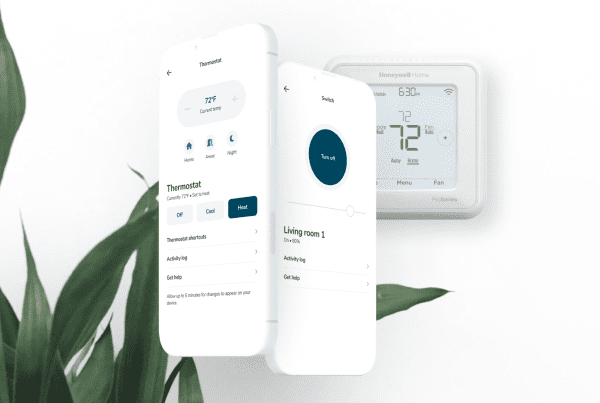
It’s hard to remember now, but there was a time when Airbnb was considered crazy.
World famous investors called the idea impossible and dangerous. “No one is going to let a stranger sleep in their home,” they said.
But then, people did. Hosts opened up their homes, and a magical new travel experience was born. Airbnb now has more rooms than any hotel chain in the world.
We’re experiencing a similar revolution today with in-home services. We can hire people to walk our dogs, clean our apartments, and do our laundry while we’re away or at work. Amazon, the king of home delivery, wants to drop off packages inside our doors. What’s next? How about fresh groceries delivered directly to your fridge?
In-home services hold just as much promise as Airbnb, possibly more. But they still face a serious challenge, one that took Airbnb years to overcome: trust.
Airbnb could have never been successful if they didn’t build trust into their service through online profiles, verified photos, and customer reviews.
The same is true for in-home services. Today, ordering a dog-walker is a trust issue as well as a logistical issue. Do you hide a physical key under your mat? How do you know they came and went like they were supposed to?
To take these services mainstream – and to realize the vision of Living as a Service – we need to build trust into the system. Smart apartments hold the key (literally) to making this a reality.
Smart Apartments and the System of Trust
There isn’t one single feature that makes smart apartments the perfect platform for in-home services– it’s the combination of technologies.
Specifically, there are three pieces of technology are most important for in-home services: Smart locks, smart security systems, and the in-home services marketplace.
Smart Locks
The biggest hurdle for in-home services is providing access to the home or apartment. Physical keys are not only a logistical issue, but a serious security concern as well.
Residents with smart locks no longer have to hide a key or give out extra copies to service providers. Instead, they can assign temporary e-keys via mobile app. The e-keys stop working after the service has been completed and the door has been locked.
For additional peace of mind, smart locks record exactly when the front door has been opened and closed. There is no guessing if or when the service provider came by, or if they overstayed their welcome.
Smart security systems
I recently interviewed Andrew Thomas, the CRO of SkyBell, on the Future of Living podcast. SkyBell is an IoT-powered video doorbell that lets residents see who is at their front door.
Video doorbells are part of the growing smart security market, along with in-home video cameras, window sensors, and motion sensors. Smart security systems automatically alert residents of problems, and some even know the difference between an intruder and your dog.
Smart security systems are critical to building trust in in-home services. Imagine this scenario:
A resident orders a house cleaner for Wednesday at 11 am while she is at work. The resident is notified by her video doorbell that the house cleaner has arrived, and her smart lock tells her the front door has been opened. After 30 minutes, she gets a notification that the door has been relocked and the apartment is empty.
This level of transparency silences the voice in the back of our minds that asks, “What if?” What if the house cleaner took something? What if they didn’t lock the door? What if they never showed up?
Smart security systems put these worries to rest by giving residents as much control as they want or need.
In-Home Services Marketplace
Airbnb did not invent the concept of staying in a stranger’s home. Long before the startup was worth billions, couch-surfers found friendly hosts via newspaper listings, forums, and Craigslist.
But there’s a reason why these platforms never went mainstream. Before Airbnb, there was no way to verify the legitimacy of guests and hosts. Both sides had to take a leap of faith, and unfortunately, some people got burned.
In-home services face the same problem today. House cleaners and dog walkers are not new, but they can be difficult to trust. The majority of people don’t want to take a leap of faith on strangers– they need assurances.
Enter: the in-home services marketplace.
The first interaction with a new service provider is the most important to get right. An in-home services marketplace (much like the Airbnb marketplace) helps residents build confidence in the system before they book a job.
First, the marketplace presents a long list of verified services providers with customer reviews. Each person has a profile that residents can review to gain familiarity with their options.
Then the resident can communicate with the service provider through the marketplace, asking questions and figuring out logistics. The resident develops a connection with the service provider before they ever meet.
Marketplaces need to become standard for in-home services to flourish. In many smart apartments, they already are. Smart apartment residents can access the marketplace directly through the resident dashboard, right next to where they pay their rent and submit maintenance requests.
Homebase is leading this charge with our partnership with Walmart and their Walmart InHome service offering – which delivers any WalMart good straight into residents home, including groceries into their fridge.
In-Home Services are Necessary, but Not Inevitable
The most amazing part about Airbnb is how it brings people together. It gives people the confidence to stay with strangers and opens them up to unforgettable travel experiences.
In-home services can bring people together as well, creating a world where strangers give and receive help without hesitation.
The key to this new world is trust. As much as we want to believe in the goodness of strangers, we still need to feel safe. Smart apartments give us confidence in others by building a system of trust around in-home services.
In-home services may feel inevitable, but without trust, they will never reach the mainstream consumer. Smart apartments are the platform this new industry needs to thrive.




Blake, you’ve made some really good points in this article. Trust is a huge factor when it comes to in-home services. Although it is being more commonly accepted it’s still certainly an issue. We face the trust factor with our own brand but are quickly gaining trust from our growing customer base. We are seeing that trust grow with increased traction and they are sharing the positive experience they’ve had engaging Lula with their friends. Even if something doesn’t go perfect, they know we proactively step in and rectify it immediately. Outside of the rigorous 8-point vetting process we put our service providers through, we monitor the entire scope of the job from beginning-to-end. Not only are our service providers required to carry GL insurance, but we also have an additional insurance policy covering anything related to theft, damage, etc. Not to mention we bring one of the strongest guarantees to the industry with a policy that we take very serious which is “Be 100% satisfied or Pay Nothing”. We are building trust in the community so those that are too busy with everyday life can trust in Lula to make sure everything from properly vetting a provider to a perfectly completed in-home service happens! With the visibility that companies such as Homebase.ai brings to the multi-family smart living space and the additional layer of protection, a company like Lula brings to the resident; we will see faster adoption of in-home services! Keep up the great work!